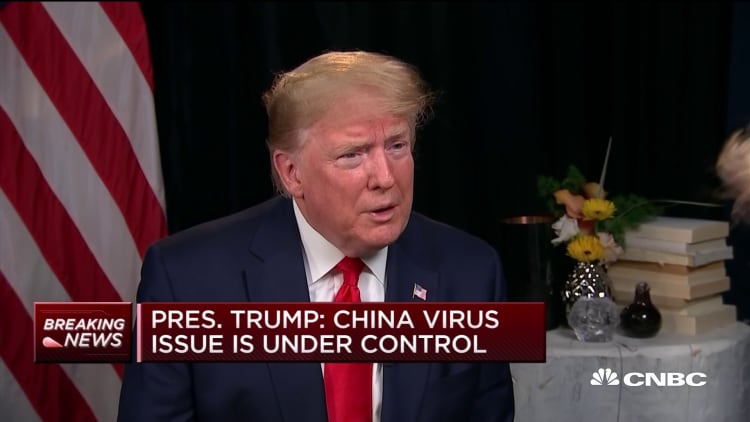DAVOS, Switzerland — Leaders of American businesses attending the World Economic Forum have privately expressed concerns about the coronavirus, which has killed more than a dozen people in China.
Several of these executives, who have investments in China, said on Wednesday that they are concerned about the virus spreading beyond China's rural areas and into heavily populated cities, according to people with direct knowledge of the matter. These people declined to be named because they didn't want to cause alarm.
The virus, which has sickened at least 440 people and killed 17 in China, has already spread into Beijing, Shanghai and Macau. Beyond China, the Centers for Disease Control and Prevention recently confirmed one case of the virus making its way to the U.S.
Some business leaders raised these concerns directly with President Donald Trump during a breakfast Wednesday morning, according to an executive at the gathering who declined to be named because the event was private.
Trump brushed aside those concerns, according to the executive, echoing comments he made earlier in the day, during an interview with CNBC's Joe Kernen that aired on "Squawk Box." The president said in the interview that he trusted China's President Xi Jinping's handling of the virus and said the U.S. has it "totally under control."
A White House spokesperson did not respond to a request for comment.
The discussions in Davos have focused, in part, on the impact the virus could have on the livelihoods of the citizens of China and people around the world if it turned into a pandemic, the people said. The talks also covered how leaders would manage their businesses amid the upcoming Chinese New Year celebrations and beyond. The holiday is one of the busiest travel days in China.
Many companies, including big financial institutions J.P. Morgan, Citigroup, Morgan Stanley and Bank of America, have offices in China and employ thousands of people there. While these American banks have yet to issue any warnings about the virus, a Europe-based financial institution has issued guidance to its staff as the virus spreads, according to a person at the bank participating in the World Economic Forum. This executive declined to be named or disclose the name of the bank issuing the guidance, given the sensitivity of the matter.
"We are advising staff to be aware of the situation, close monitoring is in place, and staff health and safety is our top priority," the bank executive said.
Some business leaders have said publicly that the spread of the virus could hurt stocks.
"We've got a curveball with this coronavirus. I think that's a big deal. If you look at what happened in 2003, estimates ranged 0.5% to 2% in GDP for China, half a percent for Southeast Asia," investor Paul Tudor Jones told CNBC's "Squawk Box" from the World Economic Forum.
U.S. business executives at the conference have been hearing privately from their Chinese counterparts that the outbreak could become equivalent to that of SARS, or severe acute respiratory syndrome, which originated in China in 2002. That virus led to more than 700 deaths. Some analysts have said the virus does not appear to be as lethal as SARS.
Not everyone in Davos is raising a red flag about the coronavirus. A medical industry executive, who declined to be named because their company sessions are private, said they had not started holding deliberations about it because they believe the virus is mostly contained in rural areas.
But Scott Gottlieb, the former commissioner of the U.S. Food and Drug Administration, told CNBC in a phone interview on Wednesday that the unknown aspects of the virus could create fear, especially if it turns into an epidemic.
"It appears, based on the limiting information we have now, that for most people it should only cause a mild or moderate illness," Gottlieb said. "But there's a lot we don't know, and even a mild illness, if it's novel and becomes epidemic, can create a lot of fear and uncertainty."

— CNBC's Lauren Hirsch and Arjun Kharpal contributed to this report.






